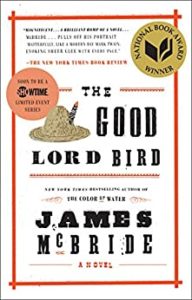James McBride’s The Good Lord Bird is a boisterous novel about abolitionist John Brown. The story begins in 1855.
Henry Shaekleford, 11, is a slave living in Kansas Territory when John Brown arrives in Henry father’s shop. Henry is wearing what many black children wore in those days, a potato sack. A violent fight ensues between John Brown and Henry’s master. John Brown, believing Henry is a girl and in danger, “frees” the young slave by taking the boy with him.
As time goes on, Henry, whom John Brown nicknames “Onion,” finds that pretending to be a girl is to his advantage. He becomes a member of Brown’s army as the renegade band of freedom warriors traverse the country, raising arms and ammunition for their battle against slavery. Onion is with John Brown and his army of volunteers when they fight for their cause in what becomes known as the Bleeding Kansas crisis of 1856. There were many other smaller skirmishers before the raid on Harpers Ferry in 1859. Brown’s intention was to initiate a slave revolt by taking over a United States arsenal at Harpers Ferry, Virginia. Onion is with the group every step of the way, fearful, yet with courage and ingenuity is faithful to John Brown.
The Good Lord Bird was published in 2013. Although this is a work of fiction, the facts are based on actual people and incidents. The vivid language and colorful descriptions are often raw, but believable. The author James McBride is black, but in reading this book, I wondered if the author were white that the book would have been criticized for what now is considered insulting language and insinuations.
The interesting title of the book is characterized by a now extinct ivory-billed woodpecker, the “Good Lord Bird,” a large bird whose feathers were considered good luck. The bird’s persona plays a part throughout the book.
I enjoyed this novel. In researching the facts surrounding John Brown, I found truth in the book’s message. It’s a story of courage and faith, and of trying to right a terrible wrong.



Thank you for the review.
Sue, I listened to the book. I also struggle with dialects. My inner voice is quite boring. The reader, Michael Boatman is an accomplished actor. He booms out John Browns sermons. Fantastic listen
You’re welcome, Stacey. I appreciate the selection of this book for our book club. I’ve read so many books I otherwise might not have chosen.
I was wondering if you liked it, Mary – and here’s your review! Sure missed being able to “cuss and discuss” about it at book club. I had mixed feelings. I think I would have enjoyed it more if I had been more familiar with the details of Brown’s history – perhaps having read a bio or history beforehand. About halfway through, the dialect began wearing on me and I had to push myself to stay with it. Maybe, for me, it just wasn’t the right time. I didn’t hate it, but was not captivated by it either. I’m glad you could see the inspiration that I missed.
Thanks for your comment, Sue. As a writer, I would find it difficult to write with that much “local” dialect. After I read the book, I did some research on John Brown and I think this book followed roughly the real facts.
Great review. I’ll be looking for this book.
Thanks for the comment, Irene. This was my book club selection. I’m so thankful to have this source of learning about books I might not otherwise select.